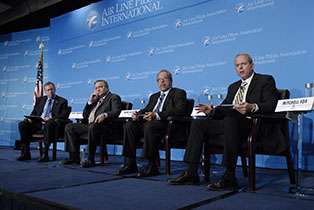Reps from the FAA, Transport Canada, and ICAO Share Insights, Concerns
 August 7, 2014 - John Hickey, deputy associate administrator for Aviation Safety with the FAA; Martin Eley, director general of Civil Aviation with Transport Canada; and Mitchell Fox, chief of Flight Operations for ICAO joined moderator Capt. Chuck Hogeman, ALPA’s Aviation Safety chair, on a panel to share their thoughts on a number of important regulatory issues. August 7, 2014 - John Hickey, deputy associate administrator for Aviation Safety with the FAA; Martin Eley, director general of Civil Aviation with Transport Canada; and Mitchell Fox, chief of Flight Operations for ICAO joined moderator Capt. Chuck Hogeman, ALPA’s Aviation Safety chair, on a panel to share their thoughts on a number of important regulatory issues.
The panel opened with a discussion about remotely piloted aircraft (RPA) and how future regulations might address these aircraft. Hickey stated that the FAA is already doing a lot, but there’s more to come. He said that while the organization has no standards in place, they’re approaching requests on a “prudent, step-by-step basis.” He said FAA hopes to release a proposed rule covering small UAS/RPA later this year, but cautioned that final regulations are “not going to be as soon as people want.”
Eley echoed Hickey’s comments, stating that integration of these aircraft into current regulations is “probably a long way away.” Fox explained ICAO’s plans, which include a global symposium in 2015 and hopes to have final, full standards in 2018. Capt. Hogeman followed up to ask if such regulations should be part of NextGen, and Hickey replied that it’s “impossible” for the FAA to look at NextGen without at least considering UAS—and there will be a bigger and bigger focus on them going forward.
The question of safety was raised as well, specifically in how the regulatory bodies intended to assure the general public that the aircraft were safe. Eley spoke to the need to educate the uninformed, especially those who aren’t aware that standards will be in place. Hickey cautioned that “taking very slow, deliberate steps” is the best way to alleviate concerns. He discussed how Amazon’s plan for use of UAS has raised expectations, but insisted the FAA would not be rushed. “We will not allow UAS into the system until we are sure they are safe,” he promised.
Panelists engaged in another lengthy discussion on the concept of “just culture” and the importance of voluntarily reported data and protecting that data from litigation or even retribution. Eley suggested that any implementation of a “just culture” needed to be driven from the top down, and said the government can be a role model in developing trust. Hickey pointed to the FAA’s long history of success in voluntarily reported data and said he anticipates an increase in the future. And Fox explained that ICAO currently has a Safety Information Protection Task Force with the goal of setting standards to determine what is and isn’t protected and to what levels; he hopes to have standards finalized in 2016. Hickey concluded by saying the FAA is “very diligent” in protecting information. “We have developed a community,” he said of labor, management, and the FAA, “and if we don’t maintain this, the information will dry up.”
Finally, the panel tackled the two recent Malaysia Airlines tragedies and discussed what impact the events might have on accident investigation and safety in the future. Regarding Flight 370, Fox said the aircraft’s disappearance has prompted a discussion on flight tracking, with the International Air Transport Association (IATA) working ahead on this issue for a fix, both near- and long-term. Hickey remarked that IATA has already come out on the need for detailed tracking in difficult portions of flight, saying, “We need something; the question is, what?” And with the latest Malaysia Airlines incident, Fox explained that a high-level task force consisting of regulatory, industry, and the pilot communities will begin work next week on an aggressive eight-week timeframe for recommendations “to make sure the right information gets to the right people and at the right time.”
|